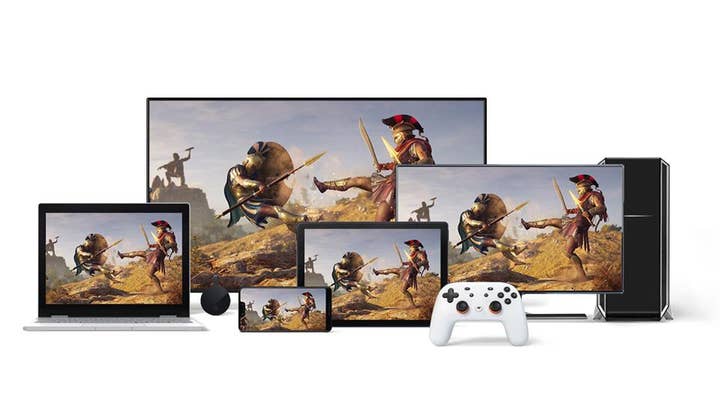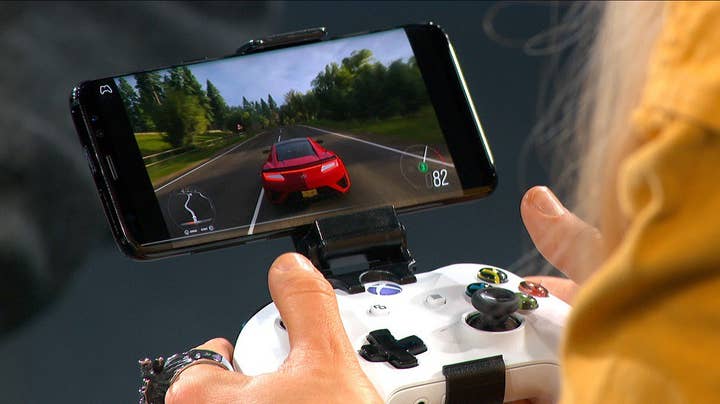Game streaming has not arrived | Opinion
On-demand tech is everywhere at E3, but there are still more questions than answers
Think of the most personally exciting things you've seen from this year's E3 so far. I'm going to go out on a limb and guess that "on-demand game streaming" is not among them.
Despite that, when the E3 show recaps are written this Friday, the push for streaming services will doubtless be among the top stories, right up there with Keanu Reeves and that sequel/remake of that classic game you loved. And when we look back on E3 2019 in years to come, Stadia, Project xCloud, and Orion may be the most industry-shaping things shown here.
It's certainly understandable. The biggest industry shifts aren't always the sexiest ones. I recall no chants of "digital distribution" during the Microsoft press briefing of E3 2005.
"In many ways E3 is about building hype, but streaming is a difficult thing to build hype for"
Of course, streaming is in a different position than digital distribution was back then. It has the potential to be just as disruptive, but it also has deep-pocketed backers, powerful companies putting plenty of money behind their own attempts to disrupt the status quo to their own advantage.
When it came to digital distribution, the big players were comparatively timid. They were publicly ambivalent about how customers would get their games, perhaps in deference to the concerns of retail partners. They tinkered with it as a side business, rolling out Xbox Live Arcade, PlayStation Network, and WiiWare not as alternative ways to buy retail games but as entirely separate catalogs of smaller original experiences.
On the other hand, it looks like the streaming companies are going to push more aggressively to have streaming as a direct competitor/alternative to non-streaming purchases for customers. When Stadia launches, it will feature new games like Doom Eternal, Ghost Recon: Break Point, and Borderlands 3. Microsoft hasn't said much about the particulars of Project xCloud, but it's widely expected to integrate with the Xbox Game Pass in some way, which already gives subscribers Microsoft's biggest AAA blockbusters and a selection of indie titles on day one.

It doesn't take a particularly vibrant imagination to see how on-demand streaming could upend the industry. Despite that, I've seen very little actual excitement over the technology this week (outside of people actively building businesses in streaming, naturally).
In many ways, E3 is about building hype, but streaming is a difficult thing to build hype for. For most players, the best-case scenario for streaming is that it feels like playing a non-streaming game. Skipping a tedious download and install process is no doubt a cool feature that could change the way people consume games, but it doesn't get a standing ovation from a crowd of superfans.
"Playing any game, anytime, anywhere, on any screen is huge. But that's not what this batch of streaming services is offering"
The idea of playing any game, anytime, anywhere, on any screen is huge. But that's not what this batch of streaming services is offering right now, and there's no telling how close they will ever get to that.
Any game? Stadia debuts in November and Google announced 31 compatible games in its launch window. Microsoft appears better positioned to deliver something closer to the ideal with its considerable library of titles (and perhaps the Game Pass lineup of third-party games), but it's still far from being a Spotify for games. And the abundance of publishers offering their own separate subscription services (Ubisoft joined that party this week) makes me skeptical that we're going to see any one service bring all the key players under the same tent any time soon.
But even if every publisher was on board with any given streaming service, will all their games fit the model? Do free-to-play games of any sort even make sense in a streaming environment? They already rely on a fraction of users to pay the freight for the creation and live service support on the game. Can those few spenders cover all that as well as the server costs of running a few million copies of games like Warframe, Dauntless or Fortnite and still provide a worthwhile return on investment? If streaming is an accessibility play to eliminate the need for expensive dedicated console hardware, well, smartphones have already done that. And they already work just fine with free-to-play as is.
Anytime? Ok, there's one.
Anywhere? Stadia recommends customers have a bandwidth of 35 Mbps to stream games well at 4K, and the most recent numbers from Speedtest put the average US fixed-speed connection at 96.25 Mbps. Speedtest reports huge variance in bandwidth from country to country, but there are a handful of significant markets where consumer bandwidth does not appear to be a key limitation. So if you're in one of those markets and planted some place with good WiFi, maybe you can make this work.
"My smartphone plan includes 10 GB of data a month. Stadia streaming at 1080p uses 9 GB an hour"
Mobile networks are another issue, and I think it's going to be a long time before kids in the backseat on a road trip will be able to have consistent connections fast enough for an acceptable experience. Even in the US, the average mobile bandwidth is 27.33 Mpbs. And even if you have a fast enough and consistent enough connection, there's still the matter of bandwidth caps on cell phone plans before throttling or overage charges kick in. I splurged for a monthly smartphone plan that includes 10 GB of data, which was the most my Canadian provider offered when I signed up last year. As PC Gamer reports, one hour of game streaming on Stadia at 1080p eats up 9GB. These caps will no doubt increase over time, particularly as 5G networks roll out and apps take advantage of greater speed, but it will be up to service providers how quickly those data caps rise, and how far.
And then there's the control issue. Playing complex AAA console experiences on a cell phone has been possible through a number of different methods in recent years, whether through virtual button overlays on the touchscreen or through third-party controller support. We've learned a few things from these attempts, among them that people like tactile feedback, don't like choosing between controlling the game or seeing the action, and rarely bother playing with external controllers. We've also learned that the places and situations where people play games on their smartphone fit better with games designed for smartphones from the start than those designed to be consumed by players over multi-hour sittings in front of the TV.

These aren't insurmountable challenges, even today. Fortnite has shown people can adapt to a virtual control scheme on mobile, and Switch has shown meaty experiences can still work on the go. But control overlays likely would need to be tailored game-by-game for optimum effectiveness, and the Switch has more in common with handheld systems of the past than smartphones when it comes to how, where, and when people use it. Streaming to smartphones is the biggest wrinkle to the gaming experience the new wave of streaming services offers, but it's one with a limited upside.
Any screen? We're getting close here. Stadia should eventually run on any device with a Chrome browser. And Microsoft has at least said it wants to enable its games to be played on any device, so if Sony and Nintendo ever decide to allow Project xCloud apps on their hardware, that could conceivably happen as well. That would also provide a somewhat unique experience; anyone who remembers playing the first multiplatform Sega games after the company scrapped the Dreamcast and went first-party can probably imagine the surreal experience that would be playing Halo using Nintendo controllers. A Switch app would solve the controller issue for on-the-go gaming nicely, as well.
So how do you get consumers excited about something with so many caveats? Without solving those above problems, I'm not sure.
You could offer games players can't get elsewhere. Google is attempting to do this with original titles for Stadia, but the fruits of those efforts would seem to be considerably far off. (And as Amazon has learned, there's more to ramping up AAA game development than simply throwing together lots of money and talent.) Microsoft isn't going to make its own games unavailable to its existing Xbox or PC non-streaming customer base. As for buying up third-party games as exclusives, Epic has shown it's not a way to win any popularity contests, and I'm skeptical that pairing unpopular business tactics with unproven technology is going to help streaming take off.
A few companies have tried to use cloud computing to create gameplay that couldn't be done traditionally, but early returns on those haven't been promising. Microsoft backed away from its original "Power of the Cloud" plan for Xbox One, Square Enix-backed Shinra Technologies shut down before shipping a title, and more recently Bossa gave up on Worlds Adrift, the first big showpiece title for Improbable's SpatialOS.
A business model like Xbox Game Pass could make for a compelling draw, but it already exists in non-streaming form, and it doesn't require streaming and the technical/logistical issues that come with it. (It's telling that Sony recently added download options to its own PlayStation Now service; streaming may be a nice way to check games out quickly, but downloading still provides a superior experience for players.)
For all their potential, streaming services just don't seem to be exciting to consumers yet. Much like digital distribution, they probably never will be. But they can still reshape the industry if they can find a compelling reason for consumers to adopt them. Digital distribution won players over with a degree of convenience consumers largely didn't even understand they wanted. While I can imagine an on-demand streaming service that re-shapes the industry by doing the exact same thing, the challenges to realizing that imagined service are tougher, more numerous, and some of them potentially insurmountable.
Game streaming is an "on-demand" technology, but anyone banking on it as the next big thing should be prepared for quite a wait.
